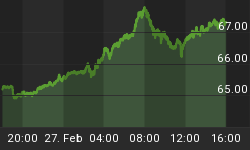The highlight of the current economic calendar is retail sales, and if your investment glass is half full, you’ll notice that U.S. retail sales for September rebounded after disappointing in August, but if you’re glass is half empty, the numbers aren’t much fodder for optimism: The real story is that U.S. retail sales rose only 0.1 percent.
The Commerce Department’s Monday report showed only a minor rebound in September retail sales, indicating a bit of a repair in motor vehicle purchases, but the biggest drop in restaurant and bar spending in almost two years.
Still, the Department was maintaining an optimistic face, saying that Q3 consumer spending demonstrated strong momentum—even in the face of weak exports and a weak housing market.
But economists had forecast 0.6-percent retail sales growth for September, so for it to come in at basically the same that August saw isn’t likely to give markets much of a boost.
The housing sector remains a key economic indicator with mortgage rates nearing 5 percent (already at their highest level since 2011, according to Forbes).
Last week, stocks plunged 4 percent—the worst dive since February.
Now all eyes will be on the flurry of earnings reports set to come out this week, starting with Bank of America on Monday, and Goldman Sachs and Morgan Stanley on Tuesday. And banks are what investors are eyeing the most right now.
BofA released earnings this morning, and if retail sales numbers disappointed, the bank’s numbers didn’t. The bank beat analysts’ estimates for Q3 profit and revenue, posting earnings per share of 66 cents—up 43 percent from a year earlier. It’s also a whopping 62 percent above analysts surveyed by Refinitiv, as reported by CNBC.
Revenue was up 4 percent, hitting $22.8 billion, just slightly beating expectations of $22.67 billion.
The big news, though, was that BofA’s money set aside for credit losses saw a significant decrease of $118 million, and this is what investors most appreciated.
The stock was trading up in the pre-market, but pared those gains in the early morning, despite the upbeat results because this was a bit of a mixed bag. The investment banking unit saw an 18-percent drop in fees for the year, and trading revenue saw a 2.5-percent drop, while deposits grew 5 percent. Related: “Enormous Piles Of Cash” Are About To Return To The Market
The next big earnings on investor radar will be Goldman Sachs, Netflix, IBM and Johnson & Johnson among the most significant.
Goldman Sachs reports on Tuesday for the first quarterly earnings under new CEO David Solomon. For Netflix, analysts are cutting price targets ahead of earnings tomorrow, sending shares down today. But that doesn’t mean there isn’t still a fair amount of bullishness for the streaming giant. Goldman Sachs lowered its 12-month price target for Netflix from $470 to $430, and Raymond James lowered it from $445 to $400. But, as Goldman puts it, it’s simply “to reflect the contraction in broader internet multiples”.
In the meantime, BNP Paribas is saying that the markets might not be prepared for a change in Fed strategy, advising that now is the time to start buying 10-year U.S. bonds following a major sell-off in the bond market last Wednesday. That sell-off saw 10-year bond yields reach 3.26 percent—the highest in seven years. In turn, that led to a U.S. equities rout, as reported by Business Insider.
Three more interest rate hikes could be on the way, based on Fed comments, but BNP analyst Laurence Mutkin says there’s no need to fear this—yet.
"The US 10-year yield is already above our year-end target, and the market is pricing in more than the two further Fed hikes that we expect," Business Insider quoted Mutkin as saying.
By David Craggen for Safehaven.com
More Top Reads From Safehaven.com:
















